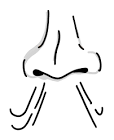| anglais > français | |
|
| breathe | |
| 1. v. (1): respirer. | |
| 2. v. Respirer. | |
| anglais > anglais | |
|
| breathe | |
| 1. v. (top, en, Bodily functions) (intransitive) To draw air into (inhale), and expel air from (exhale), the lungs in order to extract oxygen and excrete waste gases. |  |
| 2. v. (intransitive) To take in needed gases and expel waste gases in a similar way. |  |
| Fish have gills so they can breathe underwater. |  |
| 3. v. To inhale (a gas) to sustain life. |  |
| While life as we know it depends on oxygen, scientists have speculated that alien life forms might breathe chlorine or methane. |  |
| 4. v. (intransitive, figurative) To live. |  |
| I will not allow it, as long as I still breathe. |  |
| 5. v. To draw something into the lungs. |  |
| Try not to breathe too much smoke. |  |
| 6. v. (intransitive) To expel air from the lungs, exhale. |  |
| If you breathe on a mirror, it will fog up. |  |
| 7. v. To exhale or expel (something) in the manner of breath. |  |
| The flowers breathed a heady perfume. |  |
| 8. v. To give an impression of, to exude. |  |
| The decor positively breathes classical elegance. |  |
| 9. v. To whisper quietly. |  |
| He breathed the words into her ear, but she understood them all. |  |
| 10. v. To pass like breath; noiselessly or gently; to emanate; to blow gently. |  |
| The wind breathes through the trees. |  |
| 11. v. (intransitive) To exchange gases with the environment. |  |
| Garments made of certain new materials breathe well and keep the skin relatively dry during exercise. |  |
| 12. v. (intransitive, now rare) To rest; to stop and catch one's breath. |  |
| 13. v. To stop, to give (a horse) an opportunity to catch its breath. |  |
| At higher altitudes you need to breathe your horse more often. |  |
| 14. v. (transitive, figurative) To passionately devote much of one's life to (an activity, etc.). |  |
| Do you like hiking? Are you kidding? I breathe hiking. |  |
| français > anglais | |
|
| respirer | |
| 1. v. to breathe |  |



